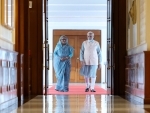Column

Demand for blasphemy laws in Bangladesh
Initially, when the bloggers-led Shahbag movement started in February, the Sheikh Hasina-led government heaved a sigh of relief. The movement started demanding death sentence to the Islamists who had committed heinous crimes against humanity and rape to throttle the birth of Bangladesh in 1971. Sheikh Hasina became happy hoping that the movement would unify the pro-liberation forces and brighten Awami League’s electoral
prospects.
At the outset, BNP cautiously welcomed the Shahbag movement, but warned the government not to make political mileage from the demand for death to war criminals. Realizing that her soft-pedaling on Shahbag issue will put her alliance partner Jamaat- e-Islami (JEI) in jeopardy, BNP Chairperson Khaleda Zia soon changed her stance and began a campaign in the media to spread the message that most of the bloggers are atheists and anti-Islam whom the Mullahs call ‘Murtad’ (apostate).
This vile campaign worked. Sheikh Hasina and her associates were alarmed. Sheikh Hasina does not want to spoil her party’s poll prospects. The next parliamentary elections are due in less than a year. BNP is likely to make attempts to utilize the Islamic card, accuse Awami League of being soft on ‘Murtads’ and anti-Islamic forces. This prompted the Prime Minister to go tough against the ‘atheist bloggers’ and crack her whip against them. Soon a number of bloggers were arrested on charges of hurting religious sentiments of the people. Interestingly no actions are taken against bloggers who posted articles against Hinduism or Christianity.
One of the arrested bloggers is Asif Mohiuddin. Asif, stabbed by Islamist extremists, is now waiting to see if the government succumbs to the demands of the Islamist thugs who stabbed him. In the World of Islamic extremism, saying words they do not like is evil. Stabbing someone for evil is acceptable. Two bloggers, Subrata Adhikary Shuvo, and Russell Parvez, who have been arrested for blogging are also currently awaiting their fate.
Hefazat-e-Islam (Protectorate of Islam), a relatively new organization, unleashed riots on Dhaka streets recently to mount pressure on the Awami League-led government to implement its 13-point demand, including enactment of blasphemy laws to punish those who insult Islam and its Prophet. A top leader of a radical outfit, Junaid Babunagari, demanding a tougher blasphemy law in Bangladesh, has been remanded to police custody in connection with raging violence that has claimed 28 lives, even as the BNP called a two-day national shutdown to protest the crackdown on marauding Islamists.
The BNP-led 18 party alliance, with the fundamentalist Jamaat-e-Islami (JEI) being a constituent of the alliance, called for two days of general strike to protest, what they said were \'atrocities\' on Hefazat activists. Hefazat Cultural Secretary Ashraf Ali Nizampuri said his outfit was extending support to the two day shutdown called by the BNP. He also warned that Hefazat would start tougher agitation programmes if blasphemy laws are not enacted and its leaders and activists not freed by 12 May.
In April Hefazat issued a list of 13 demands and gave a deadline of May 5 for the government to comply. It wants an anti-blasphemy law introduced (with provision for death penalty) and exemplary punishment to any person who “insult Islam”. Among other Taliban-like demands are: calls for the cancellation of Bangladesh’s pro-women development policy; a ban on mixing of men and women in public; an end to “shameless behaviour and dresses”; and a call for the Ahmadiyas known as reformists to be declared as “non-Muslims”. Prime Minister Sheikh Hasina has, however, turned down the Hefazat’s demands for Blasphemy Laws.
If the political parties who are at the helm and who are in the opposition yield to the capricious demands of the religious fundamentalists then Bangladesh would have no option other than to make its journey towards medieval age to be turned a backward and fanatic state.



